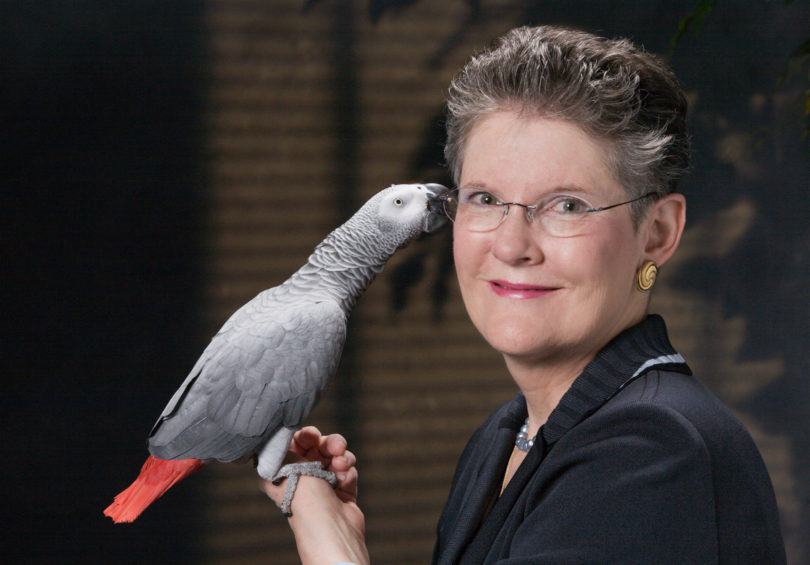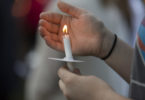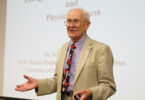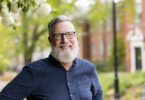For almost four decades, Betty Jean Craige has been a vital and active part of the UGA campus, most recently as the director of the Willson Center for Humanities and Arts, a position she has held for 18 years. A reception honoring Craige at her retirement will be held April 7 at 5 p.m. in Mahler Auditorium of the Georgia Center for Continuing Education Conference Center and Hotel. Faculty, staff, students and the general public are invited to attend and celebrate Craige’s service to the Willson Center and the department of comparative literature in the Franklin College of Arts and Sciences.
“Betty Jean is the consummate university citizen,” said David Lee, vice president for research.”She brings such a positive and collegial spirit to every effort and conversation; it’s uplifting just to be around her. And, there are no arbitrary boundaries to her interests. She inspires all of us, faculty, students and staff alike.”
Garnett S. Stokes, dean of the Franklin College of Arts and Sciences, agreed.
“Betty Jean Craige has, for many years, been the true heart and the always engaged mind of the University of Georgia,” she said. “Pick one person to represent the value of a liberal arts education, and it would be Betty Jean. A brilliant scholar and author, a wonderful teacher and a superb director of the Willson Center, she has been a remarkable colleague. I have asked myself how we can possibly continue without her. She has been a great intellectual presence on campus, and many years from now, I suspect we will still be putting into practice all she has taught us.”
Craige, who will work through the end of July, grew up in El Paso, Texas, graduated with a major in Hispanic literature from Pomona College in Claremont, Calif., and obtained her Ph.D. in comparative literature from the University of Washington. In 1973, she came to UGA as an instructor of comparative literature. In 1983, she was promoted to professor, and in 1995, she was awarded the title of University Professor.
In 1993, Craige was appointed director of the Humanities Center. Later, in 1996, she converted it into the Center for Humanities and Arts, and in 2005, with an endowment from Jane and Harry Willson, it evolved into the Willson Center for Humanities and Arts. During her 18 years as its leader, the Willson Center has provided research support for faculty and brought them together across disciplinary and cultural boundaries. In that time, Craige and Gary Bertsch, then-director of the Center for International Trade and Security, co-founded and co-directed the Delta Prize for Global Understanding.
Craige is a teacher, a scholar, a Spanish translator, a collector of art, and on occasion, a humorist. As a scholar, she has published 17 books in the fields of literature, politics, ecology and art. Her books Reconnection, Laying the Ladder Down, American Patriotism in a Global Society and Eugene Odum: Ecosystem Ecologist and Environmentalist explore the emergence in the 20th century of a holistic understanding of culture and nature.
As a translator, she brought into English the poetry of Antonio Machado, Gabriel Celaya, Manuel Mantero and Marjorie Agosín. She produced a documentary titled Alvar Suñol: His Vision and His Art, which won first place in short documentary at the Indie Gathering film festival in 2006. In addition, she guest-curated two museum exhibitions of Alvar’s work.
In her latest book, Conversations with Cosmo: At Home with an African Grey Parrot, published in both hardback and audiobook, she wrote about her own pet bird’s acquisition of language and development of a sense of humor.
Craige commented that she loved teaching as much as writing. In her last few years at the university, she has taught a class in ecocriticism, in which she and her students examined ideas about the relationship of humans to non- human nature and the environmental consequences of those ideas.
Craige also recalls the many friends she made during her time here.
“What probably has given me the greatest pleasure over the years are the friendships I have made across campus, in many disciplines very different from my own,” she said. “These friendships have influenced profoundly my research, teaching and social life. Where other than at a great research university is it possible to spend one’s life with smart, fun people who are all trying to figure out how the world works, but in very different ways?”







